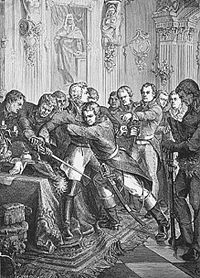
The Coup of 1809 (Swedish: Statskuppen 1809) also referred to as the Revolution of 1809 (Swedish: Revolutionen 1809) was a Swedish coup d'état 13 March that year by a group of noblemen led by Georg Adlersparre, with support from the Western Army.[1] The coup resulted in the deposition of King Gustav IV Adolf and the introduction of a new Instrument of Government.[2][3] The coup was provoked by the disastrous Finnish War. The leaders of the coup are known in history collectively as 1809 års män ('Men of 1809').
The coup executors convened a parliament or Riksdag, which met on 1 May, and handed over power to it. The Riksdag declared the king deposed and elected his uncle Charles XIII as the new king. In negotiating the new constitution, Charles XIII and subsequent kings were able to retain some measure of absolute power with the Royal Right of Disposal.
- ^ Georg, Count Adlersparre at the Encyclopædia Britannica
- ^ "statskuppen 1809 - Uppslagsverk - NE.se". www.ne.se. Retrieved 2021-05-04.
- ^ Isakson, Börje (2009). Två dygn som förändrade Sverige : 1809 års revolution. Stockholm: Natur & Kultur. Libris 10701773. ISBN 978-91-27-11760-0